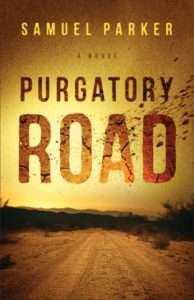Samuel Parker’s debut novel, Purgatory Road (Revell) is a thrilling trip through the Mojave Desert. A husband and wife find themselves lost during an excursion in Las Vegas. While held hostage by a desert hermit, their path collides with a runaway seeking shelter from a psychopath. What will escape require of them? Do they have what it takes to survive despite their circumstances and the brutal environment? The author answered a few of our questions…
 What inspired this story?
What inspired this story?
A trip to Las Vegas—life imitates art, and vice versa. My wife and I took a long weekend trip there and spent time traveling in the desert west of Vegas. The landscape itself was inspiring enough to get the mind going. The character of Boots, I will admit, was just a lucky epiphany at the time. I think I could write until the end of my life and struggle to create a character like him again.
This is a fantastical, yet dark story. Are any of the pieces pulled from reality?
The fantastical elements are pure imagination. I did have a case of heat exhaustion as a kid once and the vivid memory of that experience fed into some of the description of what I would imagine the characters would feel like out in the desert.
 What sort of research did you conduct for this book?
What sort of research did you conduct for this book?
I shared an early version of the book with a few readers that either lived near the Mojave, Sonoran or Chihuahua Deserts. I was nervous about them reading the story because I was just a quick observer of the environment, but I’ve been told I captured it well.
This novel is really a story of good versus evil. How does your faith inform your writing?
I think as a writer, you need to employ all aspects of your thought process to execute a good story. Nothing should be held back or reserved whether that is memory, ambition, beliefs or doubts.
I also think those same thought processes are constantly growing and changing, evolving and eroding, and so to be conscious of that constant flux and to infuse that into a story brings it to greater life. My beliefs as a child are different than where I am now, just as assuredly as my 80-year-old self will be different. Being comfortable with that idea allows me to pose bizarre questions and carry them to what are, hopefully, interesting and suspenseful conclusions.


